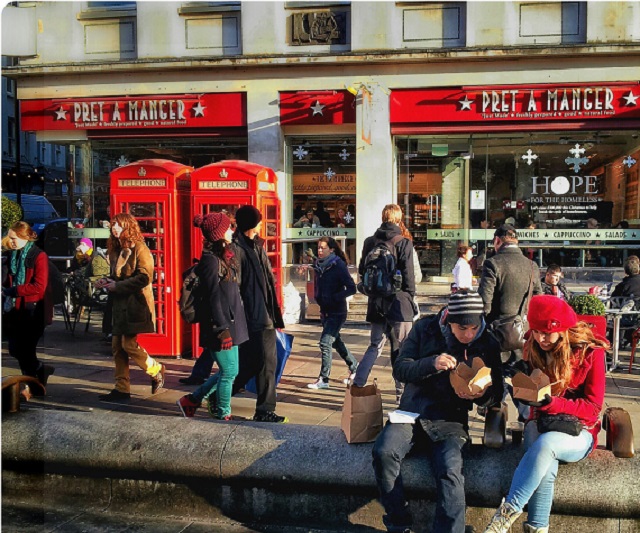We should not save Pret Comment
New in Ceasefire, Politics - Posted on Friday, September 4, 2020 16:08 - 2 Comments
By Paul Ray

“Food by Pret” (Credit: Garry Knight/licensed under Creative Commons BY 2.0
Sandwich chain Pret A Manger is reportedly on life support, with 3,000 jobs at risk from the business’s imminent collapse. Pret is in trouble because of the sudden drop in demand from one of its main customer demographics: the hungry office worker coming in on her lunch break, needing quick food and coffee to be able to get her through the rest of the working day. During the COVID-19 pandemic most of these workers have either been furloughed or have been working from home, depriving the Prets of the UK of much of their income.
Unsurprisingly, the British government wants its white-collar workers back in their offices as soon as possible, presumably so that they may buy sandwiches and coffees and resuscitate Britain’s ailing urban economies and high streets. Tory-supporting commentators and newspaper editors are portraying the return to the workplace, and the attendant spending nearby, as some civic duty, couching their injunctions in the language of business confidence and macroeconomic stability. If Pret falls, the city of London falls, all shall be lost.
No leftist should celebrate the loss of 3,000 jobs in the extremely harsh labour market we’ve found ourselves in, but we must reflect on what, exactly, is being lost here. Shops like Pret are paradigmatic examples of the ‘boring dystopia’ of urban Britain: they are anonymised, sanitised clones, characteristic of the suffocating and alienating urban design of late capitalism. Pret is what Marc Augé referred to as a ‘non-place’: like our supermarkets, airports, and hotels, they are totally homogenised “spaces of circulation, consumption and communication,” optimised and smoothened for incorporation into the globalised capitalist ecosystem. On a more tangible note, Pret and its contemporaries employ workers on casualised zero-hours contracts, usually at the minimum wage.
What stake do Boris Johnson and Rishi Sunak have in saving the banal dystopia of Britain’s high streets? Why do they want to shepherd workers back to stuffy offices just to save sandwich shops no-one likes from bankruptcy? One potential reason is that if these businesses fail, people might realise they don’t miss them at all, that it’s possible to imagine an urban ecosystem unpolluted by these shiny corporate non-places. Andrew Pendleton, in Tribune Magazine, recently sketched a utopian vision of urban areas as “places for people to congregate and exchange social as well economic value” – this is what the ubiquity of Pret serves to obscure.
Of course, there’s always the possibility that the Conservatives aren’t really invested in saving Pret, but rather are just trying to get people back into offices at all costs: a flimsy, superficially economic excuse to get the spatiotemporal rituals of capitalism back under control. Consider the irritating grind of the daily commute, the power-walk across the street to get your pre-packaged sandwich during your allotted 30-minute lunch break, the surreptitious scrolling through social media because there’s no work to be done, only to make yourself look busy when the boss walks by. Emotionally stressed and constantly surveilled workers are easier to control, easier to exploit.
The Left should therefore seize this moment to attempt to force changes to the mind-numbing rhythms of office work. We shouldn’t demand to work from home in perpetuity, which presents its own problems (it’s much more difficult to organise a union for diffused, scattered workers compared to an office packed with disaffected people,) but a more humanist, social approach to white collar work. Achieving such a vision is possible, and we must convey the message that office workers won’t go back to their boring, alienating rut, whether to save Pret or the whole economy.
Finally, and perhaps most obviously, workers should not be forced to risk contracting a potentially deadly virus with long-term health implications in order to save chain sandwich shops. The immune system of a thirty-year-old with a sedentary lifestyle – arguably your typical office worker – can be weaker than that of an active sixty-year-old. Offices in Britain are often cramped and poorly ventilated, with little opportunity for social distancing in lifts and corridors. Again, it is the responsibility of the socialist Left to shout this from the rooftops: office workers should not have to gamble with their health and their lives in order to save a sandwich chain.
Would you take proactive steps to preserve your respiratory health if it meant you could never have a mass-produced chicken, pesto and rocket wrap again? I think that, on balance, I would.
2 Comments
Anonymous
I’m not surprised of Pret’s fate. Spreading too fast like a virus all over the world🤑. Funny though what’ happening with the Covid-19🙃… We just have to wait and see😵



There are some really good points here. Great article.